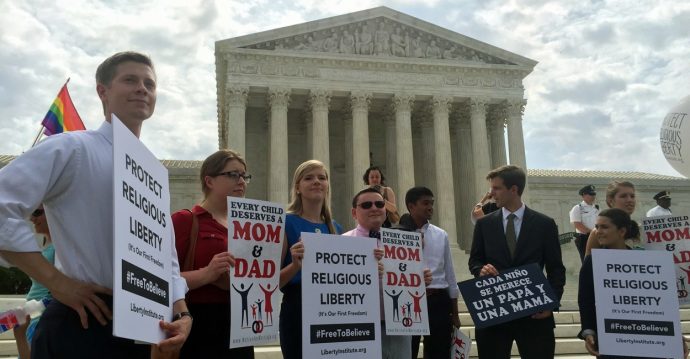Here’s the subtitle to John C. Eastman’s post over at National Review: “When the Supreme Court oversteps its bounds, citizens are right to resist.” Here are a few excerpts:
Until her release earlier today, Kim Davis, the clerk of rural Rowan County, Kentucky, was confined to a jail cell because she refused to issue marriage licenses over her name to same-sex couples. She has been pilloried in the media for “lawlessness” and compared not to Martin Luther King Jr. for her civil disobedience but to Governor George Wallace of Alabama. Michael Keegen of the grossly misnamed People for the American Way called her actions an “abuse of power” and proposed instead that she should “find another line of work” — that is, resign her elected office — if she “can’t in good conscience fulfill [her] duties.”
The double standard on display is palpable. I don’t recall Keegen or any of the other self-righteous, newfound devotees of the rule of law calling for the resignation of Kentucky’s attorney general when he refused to defend his state’s marriage law — or any of the other state attorneys general who did the same, from California’s Jerry Brown to Pennsylvania’s Kathleen Kane, and several others, including perhaps most notoriously Oregon’s Ellen Rosenblum, who was caught actively colluding with plaintiffs to ensure judicial invalidation of the Oregon marriage law she disliked.
…
Kentucky has a Religious Freedom Restoration Act, which expressly prevents the government from imposing a substantial burden on someone’s religious beliefs unless the government’s mandate is narrowly tailored to further a compelling governmental interest. Because this lawsuit is pending in federal court, the federal Religious Freedom Restoration Act, which contains the same protection, is also applicable. Ms. Davis’s lawyers have simply argued that these federal and state laws require that her religious objection to issuing same-sex “marriage” licenses over her own name be accommodated.
…
The Religious Freedom Restoration Acts, both the federal law and Kentucky’s version of it, required that Ms. Davis’s religious objection be accommodated as a matter of law. The federal court’s refusal to respect those laws is where the real lawlessness lies in this case. And of course, that lawlessness is quite apart from the not insignificant question of whether the Supreme Court’s Obergefell decision is itself lawless. Such claims did not originate with Ms. Davis, but with the four Supreme Court Justices who stridently dissented from Justice Kennedy’s diktat, calling it “illegitima[te],” “indefensible,” “dangerous for the rule of law,” “demeaning to the democratic process,” “a naked judicial claim to legislative — indeed, super-legislative — power,” “pretentious,” “egotistic,” a “judicial Putsch,” “deeply misguided,” a “usurp[ation of] the constitutional right of the people,” a “perhaps irremediable corruption of our legal culture’s conception of constitutional interpretation,” and an “extravagant conception of judicial supremacy.” The federal court’s refusal to respect religious-freedom laws is where the real lawlessness lies in this case.
Read more: National Review
Image credit: The Daily Signal.

